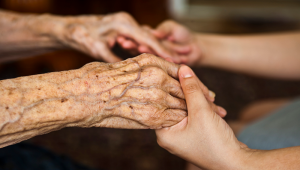13 January 2006
A blow to spending on social care services threatens a deterioration in quality of life for carers and users, but a new grant could protect this vulnerable group and ease some of the pressures on the NHS
The recent announcement by the government of the funding it is giving to local authorities next year is very bad news for social care services in particular and for disabled and older people.
The increase for adult social care services is only 3%, despite the tremendous pressures they already face. Also, the 'get out of jail' cards that local authorities previously turned to within the public sector finance game have been taken out of the pack. Because of capping, councils are no longer allowed to turn to the 'community chest' of council tax to compensate for the inadequacy of central government funding.
It is also difficult for local authorities to keep putting up the charges for services, generating financial contributions from the service users, as the social security benefit increases being received by disabled and older people are very low for next year.
So why the pressure on local authority social care expenditure?
First, there are many more very disabled and very elderly people living in our communities.
Second, the costs of labour-intensive personal care services in a competitive employment market mean that the actual cost of services rise above standard inflation. Particularly in rural areas, the cost of transport is also increasing well beyond standard inflation because of the higher cost of fuel.
But, thirdly, the most significant change is the narrowing of the definition of what an NHS responsibility is.
Despite getting significant increases in funding (8% for the forthcoming financial year), the NHS still continues to overspend. In Wiltshire, for example, the three primary care trusts are being required to take quick, dramatic and drastic action to reduce expenditure by £25m.
The responsibility for what were NHS-funded services is now being transferred to local authority social services, but no money is being transferred with this.
For example, as vacancies are held to make savings in community health services, home carers are undertaking tasks such as changing dressings, treating pressure sores, stoma and catheter care, foot care and the supervision of medicines.
The NHS is also narrowing its definition of whom it should be funding within nursing and residential care home services. For example, the NHS no longer accepts that it has a responsibility to fund services for people who, following accidents, trauma and degenerative disorders, require assisted breathing and tube feeding, or who, as a consequence of brain injury or extreme mental illness, require close supervision and behaviour management.
And as the NHS narrows its own assessment of nursing need, it is making savings on the funding it was allocated by the government to pay the nursing costs in nursing home placements.
The consequence for disabled and older people is that the assistance they require is being redefined as means-tested social care rather than free NHS care, and they could end up paying for the services.
And if they do not have the money to pay for their own services, they are likely to find that the assistance they get from local authorities is increasingly restricted and rationed. All of this is leading to a deterioration in the quality of life for disabled and older people and their family carers.
For the NHS there are increasing delays in arrangements being made by cash-strapped local authorities to discharge people from hospital, with older people remaining in hospital, with exposure to cross infection, and loss of confidence, muscle tone
and capability.
There is a solution. A grant could very quickly be allocated to local authorities, focused on adult social care services (this has happened before). Based on the experience in Wiltshire, it would need to be about 20% of the savings the NHS is being instructed to make (ie about £140m). It would be sensible if the grant could be focused on the areas where the NHS is being instructed to make the largest savings, as the position with regard to NHS finances is not consistent across the country.
If the government does not act on this quickly, social care services for disabled and older people will continue to be reduced, they and their carers will experience a deterioration in quality of life and more risk and stress, and hospitals will become increasingly filled with people who should be receiving social care services to help them to be discharged.
Dr Ray Jones is director of adult and community services at Wiltshire County Council
PFjan2006



















